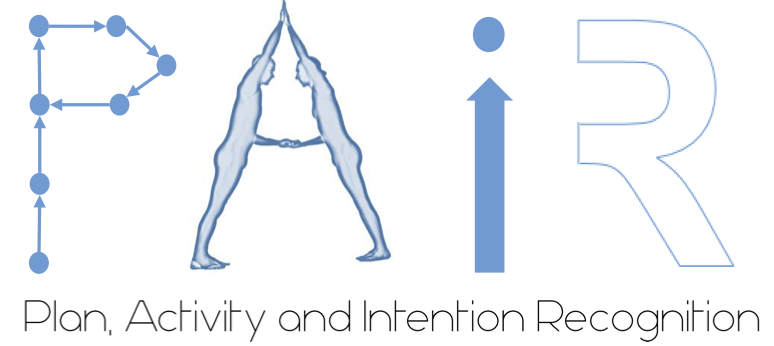Plan recognition, activity recognition, and intent recognition all involve making inferences about other actors from observations of their behavior, i.e., their interaction with the environment and with each other. The observed actors may be software agents, robots, or humans. This synergistic area of research combines and unifies techniques from user modeling, machine vision, intelligent user interfaces, human/computer interaction, autonomous and multi-agent systems, natural language understanding, and machine learning. It plays a crucial role in a wide variety of applications including:
- Assistive technology
- Software assistants
- Computer and network security
- Behavior recognition
- Coordination in robots and software agents
- E-commerce and collaborative filtering
This wide-spread diversity of applications and disciplines, while producing a wealth of ideas and results, has contributed to fragmentation in the field, as researchers publish relevant results in a wide spectrum of journals and conferences. As there is no commonly accepted conference for this work, this workshop provides a valuable place to discuss, standardize and improve past work of this sub-field. Thus, this workshop seeks to bring together researchers and practitioners from diverse backgrounds, to share ideas and recent results. It aims to identify important research directions, opportunities for synthesis and unification of representations and algorithms for recognition. Contributions of research results are sought in the following areas of:
- Plan, activity, intent, or behavior recognition
- Adversarial planning, opponent modeling
- Modeling multiple agents, modeling teams
- User modeling on the web and in intelligent user interfaces
- Acquaintance models
- Plan recognition and user modeling in marketplaces and e-commerce
- Intelligent tutoring systems (ITS)
- Machine learning for plan recognition and user modeling
- Personal software assistants
- Social network learning and analysis
- Monitoring agent conversations (overhearing)
- Observation-based coordination and collaboration (teamwork)
- Multi-agent plan recognition
- Observation-based failure detection
- Monitoring multi-agent interactions
- Uncertainty reasoning for plan recognition
- Commercial applications of user modeling and plan recognition
- Representations for agent modeling
- Modeling social interactions
- Inferring emotional states
- Reverse engineering and program recognition
- Programming by demonstration
- Imitation
Due to the diversity of disciplines engaging in this area, related contributions in other fields, are also welcome.
Theme:
This year's workshop will be centered around the relationship between data-driven and model-based approaches to recognition, and the need to bridge the gap between the two approaches. We hope this workshop will provide opportunities and incentives for future work. Specifically, we want to extend our community to include recognition researchers from the machine learning community, and we encourage them to submit their work.
Submission Guidelines:
All submissions must be original. If a work is under submission for the main conference as well or for a different conference, it should be written in the title. Papers must be in trouble-free, high-resolution PDF format, formatted for US Letter (8.5" x 11") paper, using Type 1 or TrueType fonts. Submissions are anonymous, and must conform to the AAAI-20 instructions for double-blind review.
Note that this is a non-archival workshop. We accept submissions of paper that are under review to other venues, including AAAI'20. However, if your paper is accepted to the main conference, we expect you to withdraw your submission to PAIR.
We welcome demos that will be presented in the demo session of the main conference.
Full Papers:
We accept full paper submissions. Papers must be formatted in AAAI two-column, camera-ready style; see the 2020 author kit for details: http://www.aaai.org/Publications/Templates/AuthorKit20.zip
Submissions may have up to 8 pages with page 8 containing nothing but references. The last page of final papers may contain text other than references, but all references in the submitted paper should appear in the final version, unless superseded.
Demo Track:
This year the PAIR workshop will include a demo track. The Demo session is intended to foster discussion between researchers and practitioners from academia and industry by presenting applied implementations or research prototypes of plan recognition systems. This provides a wonderful opportunity of showcasing your work within the plan recognition community and sparking conversation and potential collaborations. Authors are required to submit two items: (1) a 2-page short paper describing their system, formatted in AAAI two-column style, and (2) a video (of duration up to 10 minutes) of the proposed demonstration. Slides are also permitted in lieu of video, but greater weight will be given to submissions accompanied by videos. The paper must present the technical details of the demonstration, discuss related work, and describe the significance of the demonstration.
We welcome submission of demos submitted to the demo session of the main conference.
The demo track will be chaired by Dr. Mor Vered, and Ramon Fraga Pereira questions regarding demos should be referred to mor.vered@unimelb.edu.au or ramonfpereira@gmail.com
Confirmed Keynote Speakers:
(click the speakers name for slides from their talk):Sheila Mcilraith (University of Toronto)
Gal Kaminka (Bar Ilan University)
Hector Geffner (ICREA & Universitat Pompeu Fabra)
Cochairs:
Sarah Keren, Primary contact (Harvard University, sarah.e.keren@gmail.com), Reuth Mirsky, (Ben-Gurion University, dekelr@post.bgu.ac.il), Christopher Geib, (SIFT, cgeib@sift.net)
Demo Committe:
Mor Vered (University of Melbourne, mor.vered@unimelb.edu.au), Ramon Fraga Pereira (PUCRS, ramonfpereira@gmail.com)
Program Committee:
David Aha (NRL), Rogelio E. Cardona-Rivera (University of Utah), Ya'akov (Kobi) Gal (Ben-Gurion University), Froduald Kabanza (University of Sherbrooke), Erez Karpas (Technion University), Peta Masters (RMIT), Felipe Meneguzzi (Pontifícia Universidade Católica do Rio Grande do Sul), David Pynadath (ICT University of Southern California), Miquel Ramirez (University of Melbourne), Gita Sukthankar (University of Central Florida), Kristina Yordanova (Univsrsity of Rostock), Kai Xu (National University of Defense Technology), Shlomo Zilberstein (University of Massachusetts),



